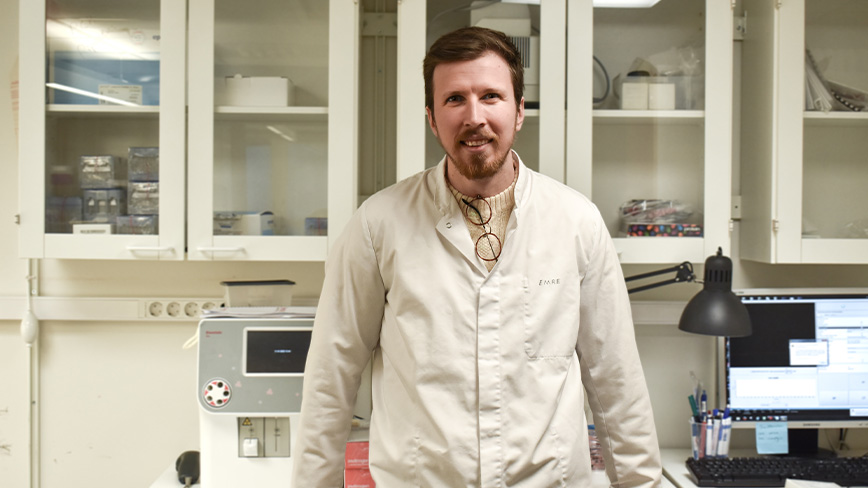Reducing global misuse of antibiotics with digital dipsticks

Antibiotic resistance is one of the biggest threats to global health today, but we still overtreat many infections with antibiotics—urinary tract infections being one of the most common. A digital dipstick created by the KTH spin-off company UTI-lizer can diagnose infections on the spot to help decrease the threat.
In Southern Europe, the prevalence of antibiotic resistance in certain bacteria and antibiotics surpasses 50%. In Sweden, meanwhile, it remains at around 5%. The World Health Organisation (WHO) lists antibiotic resistance as one of the biggest threats to global health, food security and development.
Urinary tract infections cause pain and discomfort in a significant fraction of the population; half of all women suffer from this painful condition at least once. Improved diagnostics will help each individual to better care and comfort.
“The widespread practice of treating urinary tract infections empirically increases the likelihood of misusing antibiotics and fuels antibiotic resistance,” says Emre Iseri, founder of UTI-lizer.
Iseri moved to Sweden in 2016 to begin his doctoral studies at KTH in the Division on Micro and Nanosystems. In 2022 he finished his studies and started working full-time with UTI-lizer.
He was hired within an EU project to investigate new diagnostics for infectious diseases to help fight antibiotic resistance. He learned about standard healthcare practices and related medical issues in the programme.
“Diagnosing urinary tract infections takes a long time. It requires transporting patient samples to central laboratories and costs lots of money. Therefore, antibiotic treatments without a confirmed diagnosis of bacterial infections are widespread for diseases like urinary tract infections, which causes misuse of antibiotics,” he says.
Easy to use with high-level technology
In 2017, Iseri presented his first dipstick idea six months after joining the programme.
The test is easy to use but contains high-level technology. The product combines a physical dipstick with image processing and decision-making software. The automatic generation of results from the test photograph allows for seamless integration into digital healthcare systems. The quality and level of information are comparable to that of state-of-the-art central microbiology laboratories.
“Within KTH, we did not understand the potential impact directly. But when we showed our dipstick to the clinical people in the team, they were impressed. Today we know the technique can be used in more ways than one.”
One of the stakeholder companies immediately asked if they could explore ways to commercialise the tool. But in the end, the team decided to continue developing the project within KTH.
In September 2021, UTI-lizer was established as a company. With the help of KTH Innovation, they went looking for an external CEO and appointed Sofia Bertling, who has extensive commercialisation experience in medical technology. In February 2022, when Iseri finished his doctoral studies, he put all his efforts into the company.
Today, UTI-lizer has two full-time and four part-time employees. A typical day is filled with investor meetings, meetings with medical doctors, healthcare providers, labs and continued research and development to finalise the product.
In 2023 they aim to expand their business further and develop clinical tests adapted to patients at healthcare centres. By 2026, Iseri wants to see the product on the market.
“My main motivation is to make an impact. I want to see change,” Iseri says.
Making a real impact
The presence of urinary tract infection symptoms does not necessarily indicate a bacterial infection. The UTI-lizer test rreveals whether the patient has a bacterial infection and which type of bacteria. This makes it easier to determine the need for antibiotic treatment and, if necessary, which type.
“Taking the diagnostic test to the point of care will improve the patient’s health and help decrease misuse of antibiotics. But also cut costs and form an excellent tool to support the transition towards digitalised healthcare. We can change how urinary tract infections are treated and impact society,“ Iseri says.
Text: Charlotta Alnersson
Related news

Better data analysis can improve treatment of Parkinson’s disease
More accurate data help understand how extensive local brain networks are affected in patients.
Read the article
KTH researchers developing new approaches to robotics
Robotics has the potential to unlock large benefits for society, but new applications, such as assistive robotics functions in healthcare require fundamental breakthroughs in how robots reason and int...
Read the article
Four codes that can change the future of energy use and cancer treatments
Over the next four years, researchers at KTH will optimize four codes that can have significant impact on global energy use and the treatment of cancer patients. But competition is fierce between rese...
Read the article